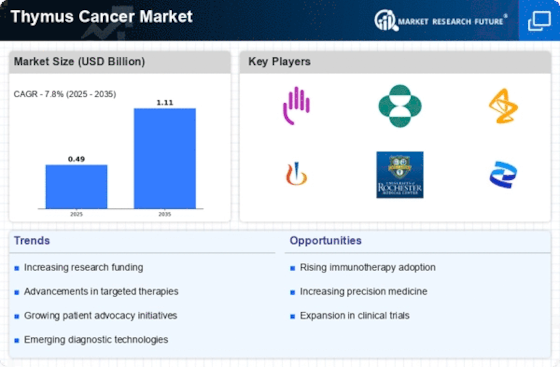Market Share
Thymus Cancer Market Share Analysis
The thymus cancer market poses unique challenges, demanding tailored strategies for market share positioning. Companies in this space focus on a multidimensional approach, encompassing research, innovation, targeted marketing, and global collaboration. The understanding of thymus cancer serves to be the initial foothold for an effective market positioning. Companies carry out deep research that helps in resolving the complications relating cancer of endocrine gland to get its particular subtypes, molecular markers, and treatment gaps so that to inform the development of new therapies. Innovation is the most distinguishing factor through which differentiation can be achieved. Businesses that develop such revolutionary medical techniques already offer a wide range of immunotherapies, targeted therapies, and personalized remedies as more accurate and less invasive treatment options for patients with thymus cancer. Efficient marketing bases on established discordance with the specifics of thymus cancer. The personalized marketing campaigns corporate companies offer to specialists and patients inform them about the drug specifications, ways of action and outcomes. In order to eliminate the rarity of thymus cancer, sometimes companies may try global clinical trials or collaboration. These help in generating different sets of data which are subsequently used to acquire broad regulatory approvals and increase the reach of their treatments to the larger patient group. Being familiar with the regulations and navigating them responsibly is critical. These drug manufacturers aim to ensure regulatory compliance and secure quick approvals for thymus therapy, which accelerates the availabilty of patients with the disease and thereby becomes a competitive advantage. Research institutions' partnerships enhance technological and marketing developments that contribute to positioning competitors in the market. Organisations strike NGOs for scientific excellence to drive their process of developing new thymus cancer treatments due to the speed of incorporation of the latest discoveries and maintaining a build-up of new product development. The factor of affordability is the important feature for making everything successful. Pharmaceutical companies develop pricing schemes that prompt the balance between the profit-making and patients' capability to access the much-needed drugs and in addition, the assistance programs are utilized to facilitate the procedure and adherence to the patient's prescribed drugs. Dealing with digital platforms is important to put out the message. Companies through social media, online forums and educational webinars may create a high level of awareness among people about thymus cancer. Therefore, additional information and support is given to patients and their caretakers in this process. The real world data is the key to the improvement science through which analysis is performed. Companies are continuously working on the fine-tuning of thymus cancer therapies, paying attention to the performance data and patient outcome results and using these data to adjust their treatment modes and to achieve high treatment success rates.
Establishing patient support and advocacy programs is compassionate and strategic. Companies initiate programs that provide emotional support, resources, and a sense of community for thymus cancer patients, building positive brand perception and fostering loyalty. Commitment to ongoing research and development is paramount. Leading companies invest in exploring new therapeutic avenues, biomarkers, and combination treatments, positioning themselves as leaders in the evolving landscape of thymus cancer care.


















Leave a Comment